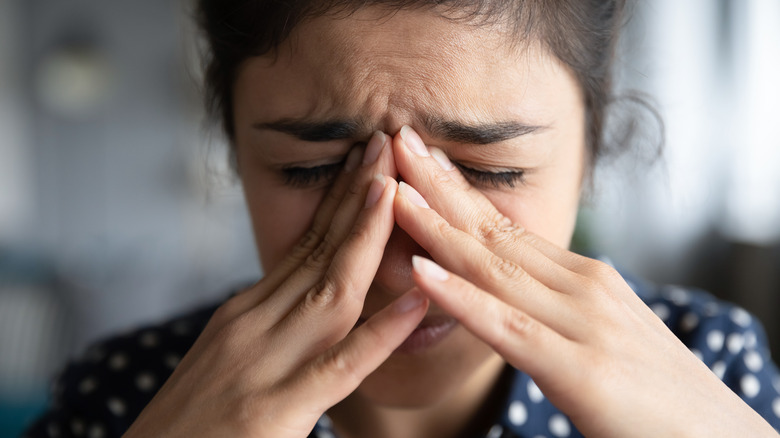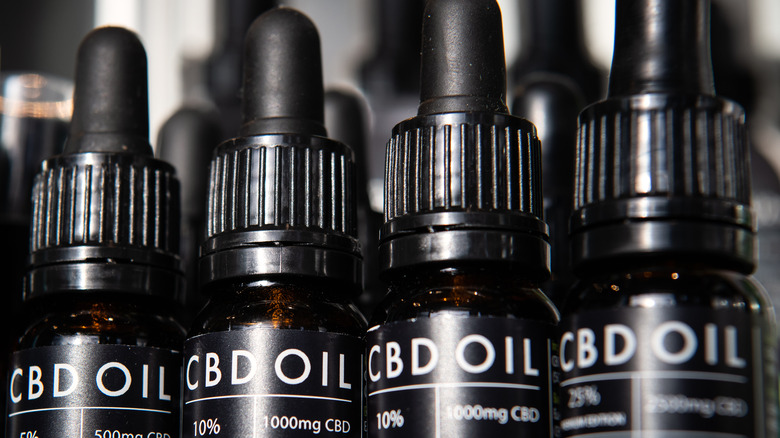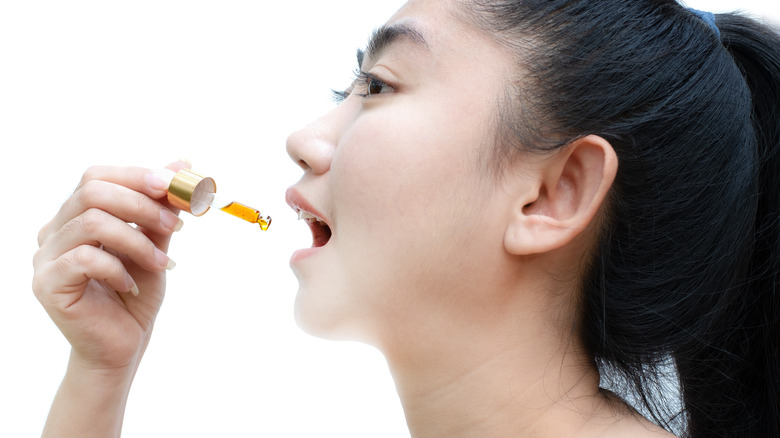How CBD Can Help Treat Panic Disorder
If you've ever felt an uncontrollable surge of dread coupled with the feeling of your throat closing in and your heartbeat pounding quickly, then you may have felt a panic attack (per Mayo Clinic). When this becomes a recurring sensation that starts to take over your day-to-day routine, you may have panic disorder. According to the National Institute of Mental Health, panic disorder is marked by anxious thoughts including "the feeling of being out of control or impending doom, an intense worry about when the next panic attack will happen, and avoidance of places" that could trigger panic attacks.
These anxious thoughts can also manifest into physical symptoms such as a high heart rate, uncontrollable shaking, difficulty breathing, nausea, and chest pain. Panic attacks often start when our body has been confronted with fight-or-flight scenarios on a frequent basis (per Anxiety.org). The National Institute of Mental Health recommends consulting a mental health professional if you have panic disorder, before trying treatment options. One such treatment approach is Cognitive Behavior Therapy (CBT), a form of evidence-based psychotherapy that trains you to change how you perceive and react to situations that can trigger anxiety.
A CBT method that can especially benefit those with panic disorder is exposure therapy, which involves exposing yourself to things that trigger you under controlled settings so that you can confront your fears. Doing things like journaling about past traumatic events or watching a show that reminds you of past traumatic experiences are forms of exposure therapy.
CBD may help ease anxiety symptoms
If you have panic disorder and feel like you need a stronger treatment than psychotherapy, the National Institute of Mental Health recommends consulting with a psychiatrist about getting a prescription for antidepressants. While these medications can be effective in treating panic disorders, you may feel uncomfortable side effects such as nausea or headaches. If you want to avoid these side effects and prefer a more natural approach, then CBD may be a treatment to check out.
Cannabidiol, otherwise known as CBD, is one of the two main active ingredients found in marijuana (per Medical News Today). Unlike delta-9-tetrahydrocannabinol (THC) though, CBD is not psychoactive. While you won't feel a "high" from CBD, there are several possible benefits CBD may offer that scientists are currently studying, from easing muscle inflammation to decreasing anxiety.
According to Cannabis and Cannabinoid Research, current research shows that when taken in low to moderate doses, CBD can reduce feelings of anxiety and panic. There's also a pending phase three clinical trial that will be examining the effect different dosages of CBD capsules, ranging in increments from 200 mg to 800 mg, can have in treating panic disorder (PD), agoraphobia, as well as generalized and social anxiety disorders. Current Neuropharmacology conducted a brain imaging study on healthy humans taking CBD and found that CBD presented "anti-panic" effects on the parts of the brain that are typically activated during a stress response in patients with PD.
CBD shows promise in treating other anxiety-related disorders
A 2015 report published by Neurotherapeutics cites preclinical data as conclusive in proving that CBD can be an effective short-term treatment for those with post-traumatic stress disorder (PTSD), panic disorder, generalized anxiety disorder (GAD), obsessive compulsive disorder (OCD), and social anxiety disorder (SAD). However, deeper studies are recommended to determine the effectiveness of CBD in chronic-use patients.
According to a 2011 study published in Neuropsychopharmacology, CBD may even provide more benefits when compared to anti-depressants and anti-anxiety medications in people with SAD. CBD acts immediately and doesn't cause severe side effects, which especially makes it useful in treating SAD. People with SAD typically feel anxiety over performance-related activities such as public speaking. CBD's immediate release action can especially be helpful in situations where a person needs to reduce their anxiety as quickly as possible. Furthermore, CBD doesn't result in developing tolerance or becoming dependent.
A 2019 experiment published in The Permanente Journal tested whether CBD could also help people who are suffering from anxiety-related sleep disorders. Two months into starting the CBD treatment, roughly 78% of the patients who were tested said they felt "improvement in anxiety and sleep," when compared to the month before. If you're interested in trying CBD, it's important to first consult with your healthcare provider (per Forbes). Whether panic attacks are keeping you from bringing your A-game, or catching some z's, CBD may just be able to help you unwind and say "TGIF!"


